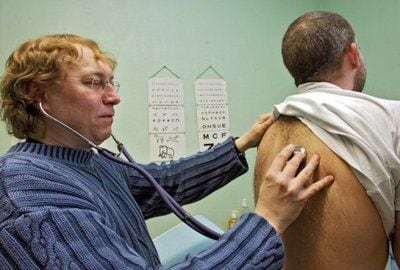This is an alert launched on Tuesday, November 14, by the Institut Pasteur. Meningococcal meningitis, potentially fatal, experienced an “unprecedented rebound” in France after the cessation of health measures put in place during Covid-19.
Thanks to the database of the National Reference Center for Meningococci, a team of scientists from the Pasteur Institute was able to trace the evolution of cases of meningococcal meningitis in France between 2015 and 2022. The results were published in the journal Journal of Infection and Public Health on October 12, 2023.
If 298 cases were recorded between January and September 2019, 421 cases have already been recorded between January and September 2023, an increase of 36%, “even though the winter peak has not yet occurred”, noted Tuesday the Pasteur Institute in a press release. Levels “never reached” in France, underlines to AFP Muhamed-Kheir Taha, head of the National Reference Center for Meningococci.
There are two main explanations for this, according to the research institute: a decrease in general immunity following the drop in the circulation of strains, but also the drop in vaccination, which fell by 20% for vaccination. against meningococcus C during the first confinement for example.
A higher number of cases than before the pandemic
During the Covid-19 epidemic, barrier gestures such as wearing a mask and social distancing had positive consequences on respiratory infections, recalls the Pasteur Institute. This was the case for meningococcal meningitis, which saw its number of contaminations drop by more than 75% in 2020 and 2021. But the reference center wondered about the future, when the protective measures would be relaxed.
Scientists who closely studied the evolution of the disease between 2015 and 2022 observed a rapid resumption of bacterial activity. “Meningococcal meningitis experienced an unprecedented rebound in the fall of 2022, with today, in the fall of 2023, a number of cases higher than the period which preceded the Covid-19 pandemic”, summarizes in a press release Samy Taha, researcher in the Invasive Bacterial Infections unit at the Pasteur Institute and one of the authors of the study.
If all age categories are concerned, it turns out that those most affected by this new wave of meningitis are young people aged 16 to 24, specifies in the press release, Ala-Eddine Deghmane, co-lead author of the study and deputy head of the National Reference Center for Meningococci at the Institut Pasteur.
In other words, explains the famous player in biomedical research in France, the bacterial strains of meningococci today responsible for meningitis are no longer the same as those circulating before the pandemic and they target more different age groups. “It’s a bit as if, with the Covid-19 epidemic, the entire system had been reset,” illustrates Samy Taha.
An unpredictable and devastating disease
Meningitis is an infection of the coverings surrounding the brain and spinal cord. In most cases, they are viral, but can also be of bacterial origin: this is the case with meningococcal meningitis. Transmission occurs from person to person through close, prolonged contact.
About one in ten people in the general population – but one in three adolescents – carry meningococci without any symptoms of the disease appearing. However, after infecting the respiratory tract, meningococci can spread through the body through the bloodstream. High fever, severe headache, vomiting, neck stiffness, photosensitivity, red or purplish spots (purpura) are the main symptoms.
Unpredictable and devastating, the bacterial disease can cause death in less than 24 hours, without rapid treatment. Properly treated, mortality from bacterial meningitis remains 10%. Meningococcal meningitis can also leave more or less serious after-effects: amputation, deafness, cognitive disorders, learning difficulties, etc.
“Reconsider the current vaccination strategy”
Different types of envelopes or capsules surround the bacteria. In the case of meningococcus, the nature of these envelopes is designated by letters. Today in France, only vaccination against meningococcus group C is compulsory, since 2018. Vaccination against meningococcus B is simply recommended in infants, since 2022.
Unlike certain countries such as Great Britain, there are no recommendations yet for the general population against groups Y and W. However, since the end of the pandemic, the latter strains are responsible for most meningitis. “We think it is time to reconsider the current vaccination strategy,” Muhamed-Kheir Taha told AFP.
The researchers, currently in liaison with the High Authority for Health (HAS), recommend in particular extending the tetravalent vaccine targeting group A, C, Y and W meningococci to adolescents, the main healthy carriers of meningococcus.
Especially since the resurgence of meningitis could increase in the coming months with the seasonal flu epidemic which creates a “favorable context for the development of meningococcal bacteria”, in particular by increasing circulation and exposure to respiratory pathogens. Another point of vigilance: large gatherings conducive to contamination and “the spread of meningococcal meningitis in particular”, specifies the Pasteur Institute.
